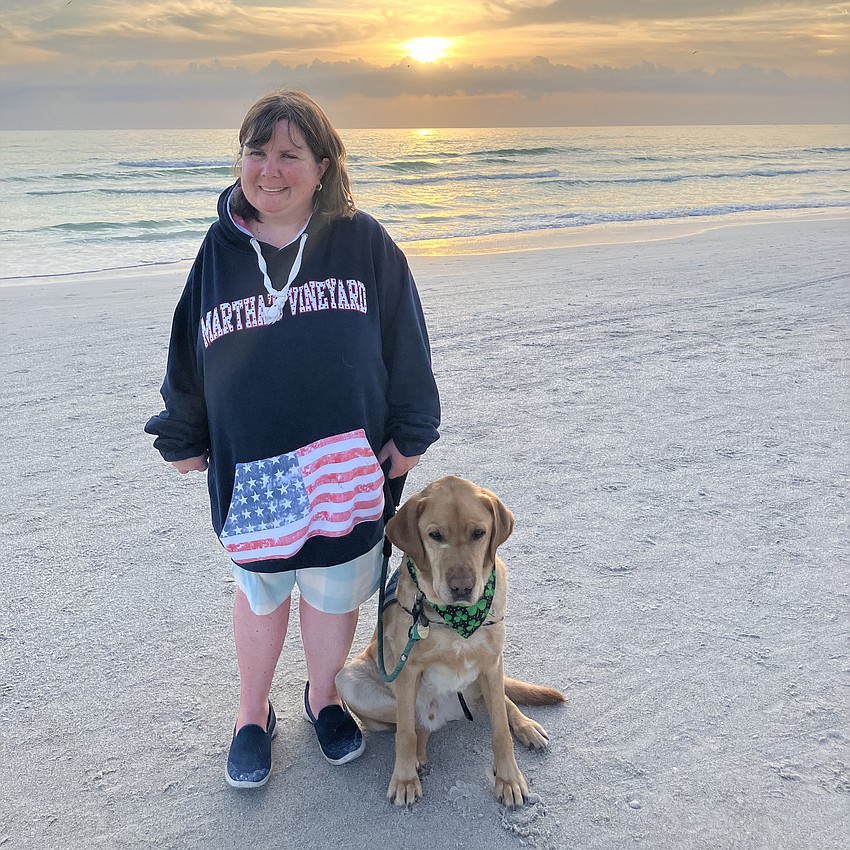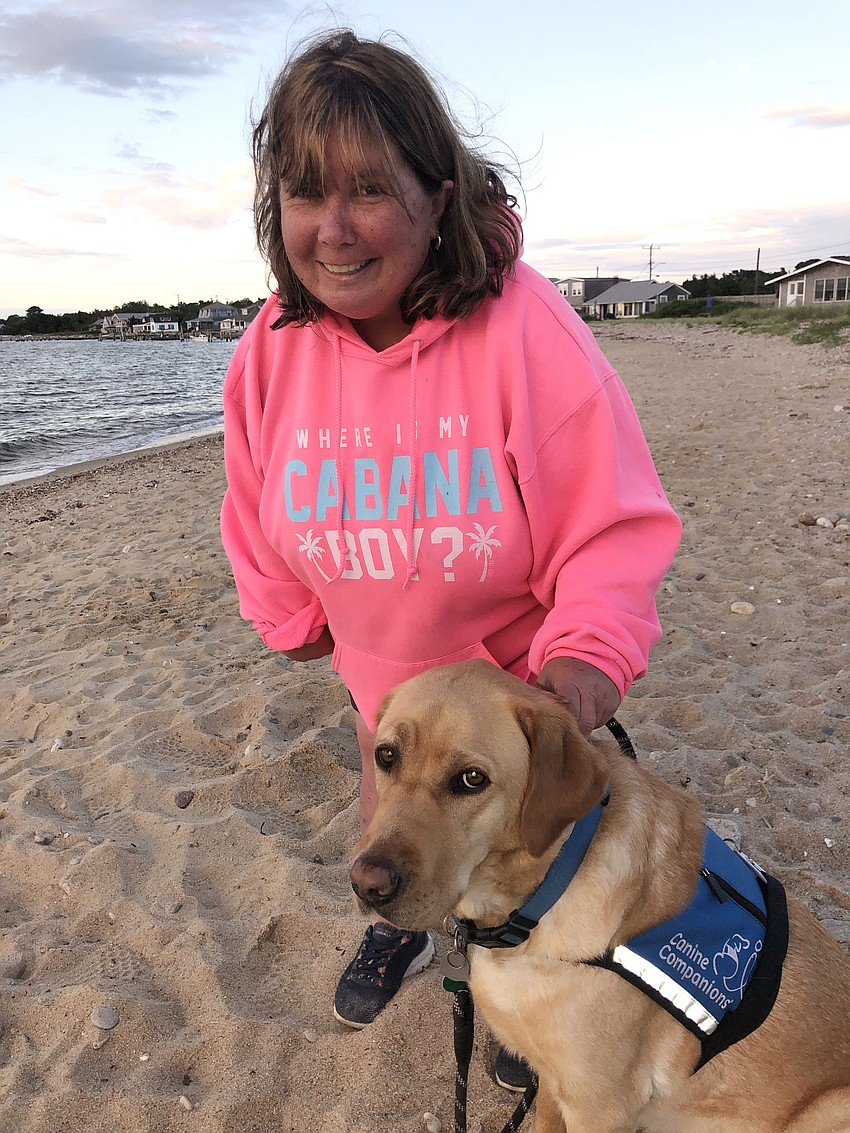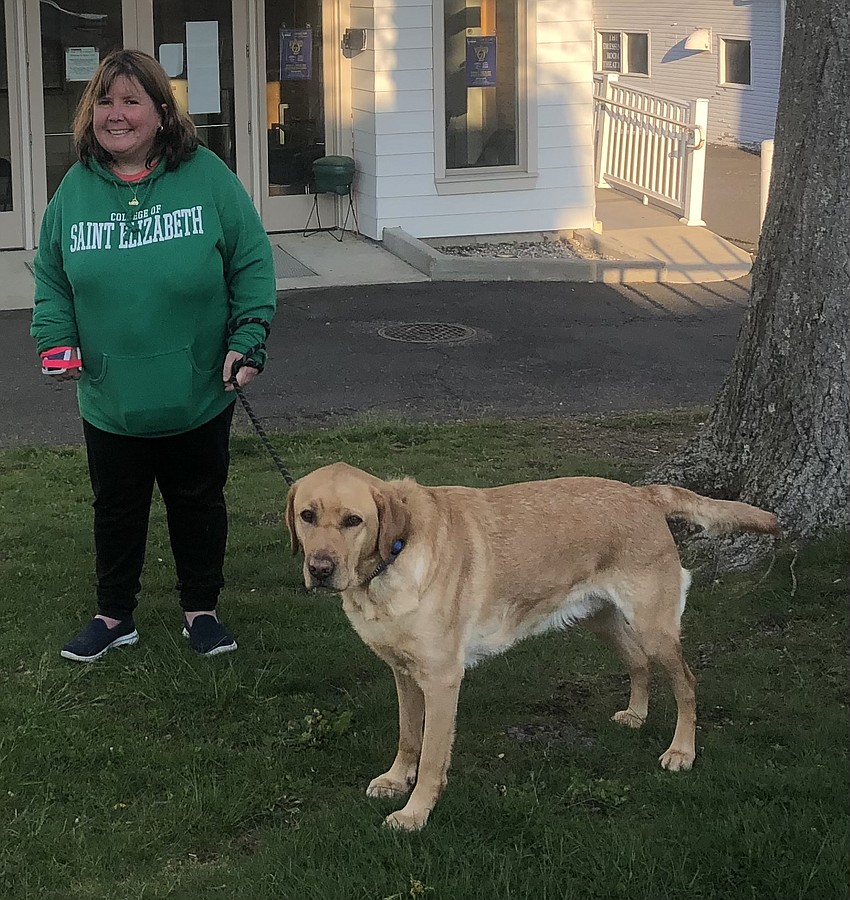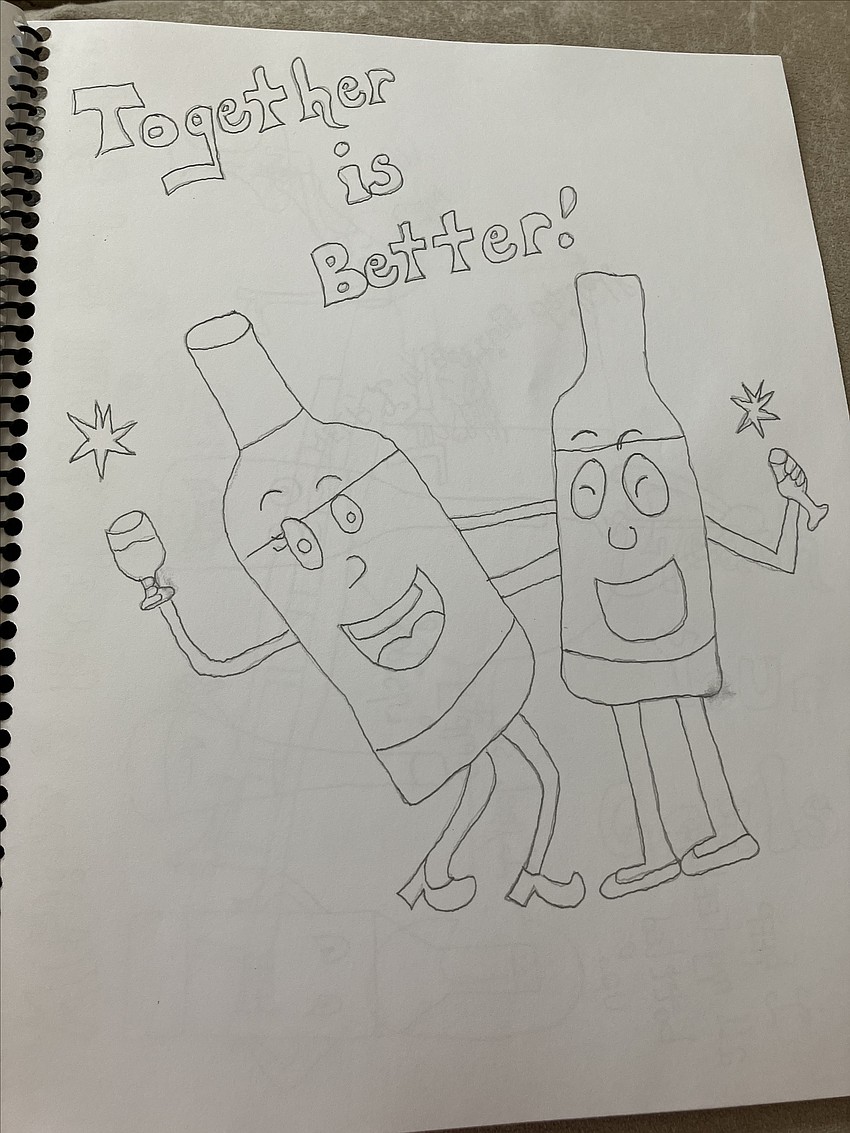- July 16, 2025
-
-
Loading

Loading
A dog named Gromit opens doors for Beth Usher, age 44.
She and her family split time each year between their home in Connecticut and Siesta Key — they fell for the barrier island community seven years ago.

But to understand Beth’s friendship with Gromit, we have to start in Connecticut.
Beth was 5 years old when the seizures began — she suffered more than 100 a day. Her only relief came when she watched “Mister Rogers’ Neighborhood.”
There was something about his voice or the methodical pace of the show that calmed her condition.
But let’s not throw around the word “miracle” too casually. Let’s save it for what happens next.
Beth had a rare condition called Rasmussen's encephalitis. (Incidence rate: one in 10 million.) There was no other cure, doctors said, except for a daylong surgery to remove the left side of her brain.
Her parents contacted Mr. Rogers’ TV studio before the operation. She was 7 years old. They hoped for a photo or maybe a letter of inspiration. Instead, Mr. Rogers called Beth before her surgery. They talked for an hour.
A few days later, the Ushers drove to Johns Hopkins Children’s Hospital in Baltimore, Maryland. The surgery, performed by Dr. Ben Carson in February of 1987, was seemingly a success. But hours later, Beth fell into a coma. Two weeks later she was still unconscious.
And then Mr. Rogers arrived, sat at her bedside. His only condition: No media.
Can you say hero?
He wasn’t there when she woke up another two weeks later. But the familiar puppets were. She had missed the show he had put on just for her.
But there were no more seizures.
When Mr. Rogers heard the good news, he came back to visit. It was the start of a friendship between Beth and Mr. Rogers that endured for decades, until Fred Rogers died in 2003.
Since then Beth has become a writer, a keynote speaker, an artist and a humor professional with the Association for Applied and Therapeutic Humor. She makes coloring books that make people laugh and that raise money for causes she cares about, like the nonprofit Canine Companions, which has a Florida branch.

So we need to talk about Gromit, a service dog who came into Beth’s life through the Canine Companions program.
There are the daily physical tasks Gromit performs for Usher. She has two titanium rods in her back supporting her spine, so it’s a struggle for Usher to retrieve dropped objects from the floor. Her right side is weaker and she can’t use that hand. Gromit brings in the mail, he can pick up pens, paper and anything else she drops. He can even open the fridge.
But the most important thing her Canine Companion does for her is to open doors. The physical ones, sure, those are important. But it’s the invisible ones that mark lives, that close us off from others or allow us to open up to them.
Gromit has opened the door to new friendships and connections for Beth, said Kathy Usher, Beth’s mom. He’s a conversation starter. His presence boosts her confidence talking to new people.
And he makes her laugh.
“I can’t imagine my life without him,” said Beth. “Gromit is my best friend. I think he truly understands me.”
It took a moment of serendipity to bring Canine Companions and Gromit into the Ushers’ lives.
Kathy was with Beth at a doctor’s office in Connecticut. In the waiting room there was a boy with a well-mannered dog wearing a vest, who picked up the items he dropped.
Kathy asked the boy’s mother about the dog.
Kathy looked up Canine Companions online and learned about how the organization places service dogs with adults and children with disabilities, veterans with disabilities or post-traumatic stress disorder and health care and criminal justice professionals. The dogs receive extensive training and are placed at no cost to the recipient.
Soon after, Kathy submitted an application.
She didn’t tell her daughter about it at first. She didn’t want to get Beth’s hopes up.
The family had a dog before — a pet, not a worker. His name was Casey and he was a golden retriever who became such an integral part of the family that the Ushers couldn’t imagine grieving the loss of another dog.
Until Gromit.
In 2021, the Ushers reached the top of Canine Companions’ waiting list.
But one doesn’t just pick up a Canine Companion like a puppy from a neighbor dog’s litter.
By the time the Ushers went to Long Island to the Canine Companions Northeast training headquarters, the dogs they would meet had already been trained for almost two years by puppy raisers and Canine Companions staff. The volunteer puppy raisers teach the future companions the basics — sit, stay, heel. They housebreak them and acclimate the dogs to a wide variety of environments before staff members teach the dogs more advanced commands and skills.

The first few days at the Canine Companions facility in Long Island, Beth spent time with a few different dogs. The staff evaluated her and the dogs for fit. Some of the dogs were too high-energy for her needs. One went home with a Connecticut police officer, another with an occupational therapist.
And then there was Gromit. A bit of a couch potato but one with a work ethic. He was the perfect fit for Beth.
For the rest of the week and a half in Long Island, the Ushers learned how to handle Gromit and he got to know his new employers.
The Ushers had to learn his many commands. Until he hears the word “release” for example, Gromit’s at work.
Gromit had an immediate effect on the Ushers that they have felt ever since he was paired with Beth.
“I think whoever has a Canine Companion is extremely blessed. It’s changed my life in ways I can’t even explain,” Beth said. “Gromit and I have this connection.”
Beth and Gromit are together practically 24/7 and he is nothing if not punctual, Beth said.
Breakfast is at 9 a.m. Bedtime is at 9 p.m. (But only after Beth says to him, “release.”)
In between Gromit is at her side.
“I love going on long walks with Gromit,” Beth said. “And how happy he is to be around us and to play with us.”
Among her other passions, Beth designs coloring books. The first, raised money for the Association for Applied and Therapeutic Humor and sold out. The latest was inspired by Siesta Key Wine Bar and everything wine-related. The wine bar recently hosted Beth Usher Day, a fundraiser for Canine Companions (see sidebar).

“It’s like Disneyland to me,” Beth said of the time she spends on Siesta Key.
Roughly speaking, at a minimum Beth said she draws a sun or sunset a day.
“I’m going to make a wedding booklet for my cousins who are getting married in November,” said Beth.
She did a design for a friend, a widow, who lives on Siesta Key. Her husband was a WWII veteran and used to play “Taps” on a bugle each evening. Now she plays a recording.
And now she has some new artwork — a Beth Usher design.
It seems strange to think that such a person should have trouble making friends, but it's been a challenge for her.
“The No. 1 thing (with Gromit) is companionship. It’s really amazing how Beth is really friendly and outgoing, but because of her disability making friends is difficult,” Kathy said. “People stop her to talk to her about Gromit. It’s given her a lot of confidence in talking to people.”
As Beth works on a new design, Gromit lies at her feet, relaxing until a task arises. When they’re apart, which isn’t often. Gromit misses her.

“(Beth) was lonely,” said Kathy. “Gromit is so thrilled to see her when she comes home. It’s just made her feel tremendous.”
And Gromit keeps pace with Beth. Literally. She walks with a limp, so when they walk together, which they do almost everyday, he moves at her pace.
And here’s the wisdom of dogs. Much of our world moves at an unforgiving pace, rarely bending itself to our needs. Not dogs, not the best of them. We can’t speak their language. But they can speak ours, without saying a word.
“He’s smarter than me, my mom and my dad put together,” said Beth.
Gromit is 5 years old now. He’s due for retirement at age 8. Technically, he doesn’t belong to the Ushers. Not yet.
The Ushers will legally adopt Gromit when he retires. They hope to get another service dog for Beth afterward.
“(Gromit) wouldn’t be required to work,” explained Kathy. “He’d be a pet.”
He'll still open doors, though.